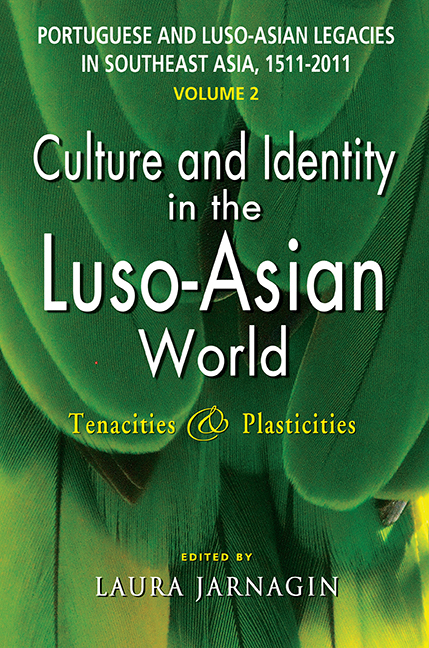 Portuguese and Luso-Asian Legacies in Southeast Asia, 1511-2011, vol. 2
Portuguese and Luso-Asian Legacies in Southeast Asia, 1511-2011, vol. 2 Book contents
- Frontmatter
- Contents
- List of Figures and Tables
- Preface
- List of Contributors
- Glossary
- Introduction: The Qualitative Properties of Cultures and Identities
- Part One Crafting Identity in the Luso-Asian World
- Part Two Cultural Components: Language, Architecture and Music
- Part Three Adversity and Accommodation
- Appendix: Maps
- Bibliography
- Index
- Titles in the Nalanda-Sriwijaya Studies Centre Series
Introduction: The Qualitative Properties of Cultures and Identities
Published online by Cambridge University Press: 21 October 2015
- Frontmatter
- Contents
- List of Figures and Tables
- Preface
- List of Contributors
- Glossary
- Introduction: The Qualitative Properties of Cultures and Identities
- Part One Crafting Identity in the Luso-Asian World
- Part Two Cultural Components: Language, Architecture and Music
- Part Three Adversity and Accommodation
- Appendix: Maps
- Bibliography
- Index
- Titles in the Nalanda-Sriwijaya Studies Centre Series
Summary
Culture and Identity in the Luso-Asian World: Tenacities and Plasticities (Volume 2 of Portuguese and Luso-Asian Legacies in Southeast Asia, 1511–2011) constitutes the balance of papers associated with September 2010 “Portuguese and Luso-Asian Legacies in Southeast Asia, 1511–2011” conference organized by the Institute of Southeast Asian Studies, Singapore and the Universiti Teknologi MARA, Malacca, Malaysia. Whereas Volume 1 treats the making of the Luso-Asian world in terms of exploring how significantly differing cultures, polities, and societies interacted with one another within the South, Southeast, and East Asian theatres, Volume 2 is concerned with the “living spirit” of the communities and cultures under investigation — that is, the more elusive qualitative properties of Portuguese and Luso-Asian cultures.
The introduction to Volume 1 includes a discussion of two key features of the conference that need to be revisited here briefly, lest the context and intent of this work be misconstrued. The first of these is the selection of the five hundredth anniversary of the Portuguese conquest of Malacca in 1511 as the point of departure for considering half a millennium of actions, interactions, and reactions among the Portuguese, Asians, and Luso-Asians. In the longer treatment of this matter in Volume 1, we make it clear that our intent is not to “commemorate”, or to “celebrate”, or to attach value judgements to this particular event. Rather, we have sought to create a forum for scholarly reflection, reassessment, and reconsideration of the impact of the Portuguese presence in the Asian theatre.
The second matter that also merits comment is the use of the word “legacies” as an overarching theme. While the term has various connotations, we have employed it in a more open and inclusive sense to refer to “something that has been left, in this case, by an abstract predecessor — the presence of Portuguese and subsequently Luso-Asian peoples in Asia — and that continued for some time or still continues to survive, to be observable, and to be influential at some level of being or existing, well beyond the lifetime of its original agent, albeit with modifications along the way”.
- Type
- Chapter
- Information
- Portuguese and Luso-Asian Legacies in Southeast Asia, 1511-2011, vol. 2Culture and Identity in the Luso-Asian World: Tenacities & Plasticities, pp. 1 - 18Publisher: ISEAS–Yusof Ishak InstitutePrint publication year: 2012
